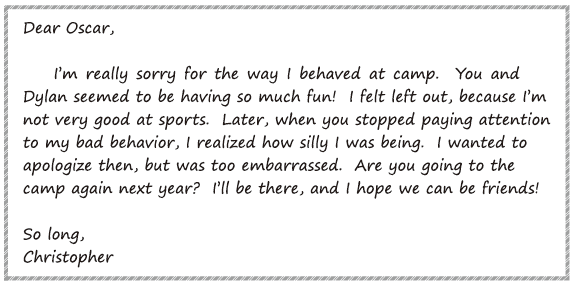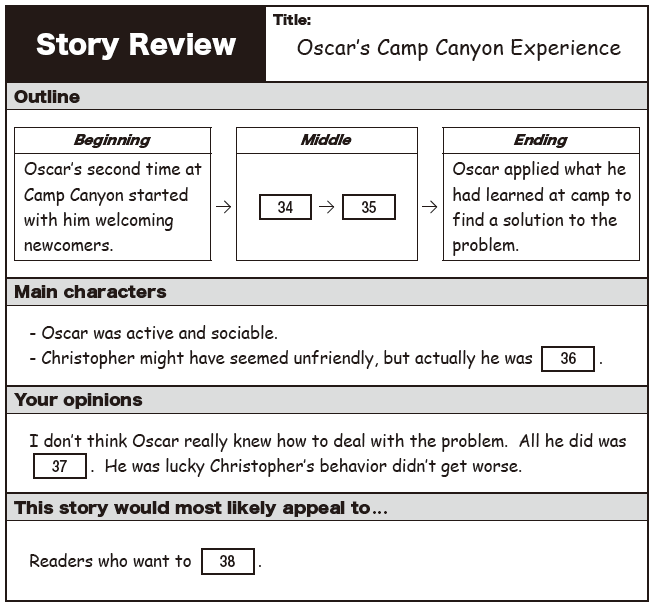You are writing a review of the story, “Oscar’s Camp Canyon Experience,” in class.
Oscar’s Camp Canyon Experience
Twelve-year-old Oscar has just finished a wonderful week at Camp Canyon. He had the time of his life — making new friends, developing new skills, and discovering a love for science among many other things. And Oscar learned an important lesson: Sometimes, when faced with a difficult situation, it’s best just to let it go. He learned, too, that things are not always what they seem.
Camp Canyon is a summer camp for boys and girls from eight to sixteen. In the U.S., there are many kinds of camps. Often, kids focus on particular skills or learn values from religious books and traditions. Camp Canyon, though, is different. Its main aim is for the kids to discover for themselves how to deal with difficult situations using ideas based on the importance of communication and mutual respect. During their week at the camp, the kids develop their powers of judgment and sense of right and wrong— all while having fun swimming, playing games, and doing hands-on science and nature projects.
This was Oscar’s second summer at Camp Canyon, and he enjoyed showing newcomers around. On the first day, he introduced himself to Dylan, a boy of his age attending the camp for the first time. Oscar spent a lot of time helping Dylan get used to his new circumstances, and they quickly became close friends. They both enjoyed playing video games and climbing trees, and at the camp they discovered a shared love of Gaga Ball, a form of dodgeball. Oscar and Dylan played Gaga Ball until they were exhausted, throwing the ball at the other kids and screaming with laughter. Afterward, sitting on their bunk beds, they would talk for hours about their home and school lives, and how much they were enjoying Camp Canyon.
One of the other campers was a boy named Christopher. Initially, Christopher seemed like a well-behaved, fun-loving boy. Oscar couldn’t wait to get to know him. However, it wasn’t long before Christopher’s behavior started to change. He didn’t bother to make his bed. He left games and other belongings lying around on the floor. He was inconsiderate and self-centered. And he was mean, as Oscar and Dylan soon found out.
“Dylan didn’t brush his teeth. And he’s smelly! He didn’t take a shower today,” shouted Christopher at breakfast, making sure all the other kids could hear.
Oscar and Dylan were shocked to hear Christopher’s comments. Oscar had always tried his hardest to make everyone feel welcome. Christopher seemed to take great delight in saying things that upset the other two boys. He even pushed in front of Oscar when they were lining up for lunch. He just laughed when Oscar angrily protested.
Oscar consulted the camp counselor about their problems with Christopher. She gave Christopher a strong warning, but, if anything, his behavior got worse. The other kids just kept out of his way, determined not to let anything spoil their fun activities at camp.
One of these activities was a discussion session with a science teacher. Although Oscar had shown little interest in science at school, this was something he really enjoyed at the camp. The kids talked with the teacher, growing increasingly excited with each new scientific fact they discovered. Oscar was particularly fascinated to learn about reflected light and how we see certain colors. A red object, for example, absorbs every color of the rainbow, but reflects only red light to our eyes.
“So,” Oscar reported breathlessly to Dylan, “a red object is actually every color EXCEPT red — which is reflected! Isn’t that amazing? I just love science!” Things, he had come to realize, are not always what they seem.
The campers also discussed ethics and the rules that would be best for the group as they experienced their week together. Whenever there was a disagreement, they stopped to consider what might be the right or wrong thing to do according to each situation. In this way, they learned to function together as a harmonious group.
Through these discussions, Oscar learned that there is not always an obvious solution to a problem. Sometimes, as with the case of Christopher’s bad behavior, the answer might just be to let it go. Oscar realized that getting upset wasn’t going to change anything, and that the best way to resolve the situation without drama would be to walk away from it. He and Dylan stayed calm, and stopped reacting to Christopher’s insults. This seemed to work. Soon, Christopher lost interest in bothering the boys.
The end of the week came far too quickly for Oscar. His memories of the camp were still fresh when, a few days after returning home, he received a postcard from Christopher.

Yes, thought Oscar, when he had recovered from his surprise, with Christopher, he had been right to let it go. Putting down the postcard, he remembered something else he had learned at camp: Sometimes, things are not what they seem.
Complete the review by filling in ( 34 ) to ( 38 ) .

問1 ⒜ ( 34 )
1. All the camp participants quickly became good friends.
2. Most campers stopped enjoying the fun activities.
3. One of the campers surprisingly changed his attitude.
4. The camp counselor managed to solve a serious problem.
問1 ⒝ ( 35 )
1. Christopher continued to behave very badly.
2. Dylan could understand how light is reflected.
3. Oscar played a leading role in group discussions.
4. The counselor reconsidered her viewpoint.
問2 ( 36 )
1. just unhappy because he was unable to take part in all the activities
2. probably nervous as he was staying away from home for the first time
3. smarter than most campers since he tried to hide his honest opinions
4. thoughtful enough to have brought games to share with his friends
問3 ( 37 )
1. avoid a difficult situation
2. discuss ethics and rules
3. embarrass the others
4. try to be even friendlier
問4 ( 38 )
1. get detailed information about summer outdoor activities
2. read a moving story about kids’ success in various sports
3. remember their own childhood experiences with friends
4. understand the relationship between children and adults
【解説】問1 正解率 24.5%
完全解答で正解となるので、正解率が低くなっています。でもこれは完全解答にする必要があったのかが疑問です。ストーリーの流れを把握する問題だと、分析に書いてありましたが、単なる内容一致問題が二つあるだけのように感じます。
もしストーリーの流れを把握する問題にしたいのなら、内容的には合っているけれども(a) より時系列で前になるという選択肢が、(b) の方に必要だったのではないでしょうか。それなら完全解答で問題ないと思います。
(a)
1. All the camp participants quickly became good friends.
「キャンプ参加者全員がすぐに良い友達になりました。」
オスカーとクリストファーは、すぐには仲良くなれなかったですね。ということで、この選択肢は違います。All とか every がある選択肢は、怪しいと疑うのが基本です。
2. Most campers stopped enjoying the fun activities.
「ほとんどのキャンパーは楽しい活動を楽しむのをやめました」
本文の7段落目に、こうあります。
「他の子供たちは彼の邪魔だけをせず、キャンプでの楽しい活動が台無しにならないように決心しました」
let anything spoil は「anything」が「spoil / 台無しにする」のを許可する、という意味です。使役の原形不定詞です。
not は to 以下の不定詞句を否定していますので、「何かが楽しい活動を台無しにするのを許可しない」となります。それを「determined / 決めた」のです。つまり「楽しもうと決めた」のですから、この選択肢は違います。
4. The camp counselor managed to solve a serious problem.
「キャンプのカウンセラーはなんとか深刻な問題を解決しました」
本文七段落目に、こうあります。
「彼女はクリストファーに強い警告を与えました、しかし、どちらかといえば、彼の行動は悪化しました」
ということで、解決できなかったのです。この選択肢はダメです。
3. One of the campers surprisingly changed his attitude.
「キャンパーの一人が意外にも彼の態度を変えました。」
本文四段落目に、こうあります。
「しかし、すぐにクリストファーの行動が変化し始めました」
ということで、(a) の正解は「3」です。
(b)
2. Dylan could understand how light is reflected.
「ディランは光がどのように反射されるかを理解できました」
本文の九段落目にこうあります。
「オスカーは息を切らしてディランに報告した。『赤い物体は本当は、反射された赤以外の全ての色なんだよ』」
しかしそれを聞いたディランが、この話を理解したかどうかは、書かれていません。
3. Oscar played a leading role in group discussions.
「オスカーはグループディスカッションで主導的な役割を果たしました」
group discussions については、十段落目にありますが、誰が主導したとかそういう話はありませんでした。
4. The counselor reconsidered her viewpoint.
「カウンセラーは彼女の見るポイントを考えなおした」
カウンセラーは七段落目以降出てきません。したがって考え直す描写はありません。
1. Christopher continued to behave very badly.
「クリストファーは非常にひどい振る舞いを続けました」
問1 (a) で確認した通り、「彼の行動は悪化した」のです。したがって正解は「1」です。
【解説】問2 正解率 32.8%
Story Review の Main characters にある ( 36 ) の部分を見てみましょう。その ( 36 ) に何が入るのかという問題です。
「クリストファーは友好的でないように思えたかもしれませんが、実際には彼は ( 36 ) でした」
1. just unhappy because he was unable to take part in all the activities
「活動の全てには参加することができなかったので、うれしくなかっただけだった」
クリストファーの手紙のこうあります。
「私はスポーツがあまり得意ではないので、取り残されたと感じました」
ということで、正解は「1」です。
その他の選択肢はこうです。
2. probably nervous as he was staying away from home for the first time
「初めて家を離れたので、おそらくナーバスになった」
そんな話はありませんでしたね。
3. smarter than most campers since he tried to hide his honest opinions
「彼は正直な意見を隠そうとしたので、ほとんどのキャンパーより賢い」
これは group discussion のことを言っているのでしょうか? それだったら、その部分にクリストファーの話はありませんでしたね。
4. thoughtful enough to have brought games to share with his friends
「ゲームを友達と共有するために持ってきたので、十分思慮深い」
「ゲームを放っておく」という話はありましたが、「共有する」なんて話はありませんでした。
【解説】問3 正解率 29.6%
Story Review の Your opinions にある ( 37 ) の部分を見てみましょう。その ( 37 ) に何が入るのかという問題です。
「オスカーは問題の対処法を本当に知らなかったと思います。 彼がしたことは ( 37 ) だけでした。クリストファーの行動が悪化しなくて、彼は幸運でした」
1. avoid a difficult situation
「難しい状況を避ける」
本文十一段落目にこうあります。
「彼とディランは落ち着いて、クリストファーの侮辱に反応するのをやめました」
なぜこうしたのかは、その直前に書いてあります。
「オスカーは、怒っても何も変わらないこと、そしてドラマなしでその状況を解決する最善の方法は、それから離れることだと気づきました」
ということで、正解は「1」です。
2. discuss ethics and rules
「倫理とルールについて話し合う」
十段落目でこうあります。
「キャンパー達はまた、彼らの一週間一緒にいた経験から、グループにとって最も良い倫理とルールについて話し合いました」
ただこれはキャンプの活動の一つであって、クリストファーの問題に対してしたことではありません。したがってこの選択肢は違います。
3. embarrass the others
「他人を困らせる」
他人を困らせたのは、クリストファーの方ですね。この選択肢も違います。
4. try to be even friendlier
「さらに友好的になるようにする」
六段落目にこうあります。
「オスカーは常に誰もが歓迎の気持ちになるように全力を尽くしてきました」
過去完了を使っているということは、全力を尽くしたのはそれまでの話で、クリストファーにはうまくいかなかったですね。
しかも選択肢の friendlier ということは、もともと friendly だったのが、さらに強まったという意味です。最初から仲がうまくいっていなかったのですから、この選択肢も違います。
【解説】問4 正解率 50.1%
Story Review の最後にこうあります。この ( 38 ) に何が入るのかという問題です。
「この話はおそらく…に魅力的だ」
Readers who want to ( 38 ).
「したい読者(38)」
1. get detailed information about summer outdoor activities
「夏の野外活動に関する詳細情報を入手する」
第二段落の内容だけ見ればそうとも取れますが、全体的にみると違いますね。
2. read a moving story about kids’ success in various sports
「さまざまなスポーツでの子供たちの成功についての感動的なストーリーを読む」
キャンプでスポーツもしていますが、それ以外にもいろいろしていましたね。
4. understand the relationship between children and adults
「子供と大人の関係を理解する」
camp counselor や science teacher など、大人の人もいましたが、それよりもメインはオスカーとクリストファーという、子供の関係です。この選択肢も違います。
3. remember their own childhood experiences with friends
「友達との彼ら自身の子供時代の経験を思い出す」
ということで、正解は「3」です。
普通にこの内容を読めば、第一段落にあるこの内容ががテーマだと思うはずです。
「困難な状況に直面したとき、ただそのままにしておくことが時には最善で、また、物事は見えているようなものでは必ずしもないことを、彼は学びました」
しかし、選択肢のこの内容のものがありません。またこの Story Review を書いた人の意見は「ただそのままにしておくことが時には最善」ということに対して、否定的です。
となると、この人がこの本の何をアピールポイントと考えているかが、正直見えにくいです。ということで、この問題も消去法で解くのが実践的ですね。




コメントをどうぞ
問2の選択肢に疑問を持ったのですが、なぜ全ての活動に参加できなかった、が答えなんですか?
本文にはスポーツの活動には参加出来なかったと書いてありますが、全ての活動に参加できなかったとは限らなくないですか?
そこだけ納得できなくて悩んでます
「全部参加できなかった」ではなく「全部には参加できなかった」ですね。
活動の全部に参加したかったけれど、スポーツには参加できなかったので、うれしくなかった
ということです。
日本語は難しいですね。わかりやすいように本文も表現を訂正しました。ご指摘ありがとうございます。